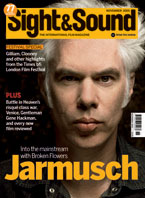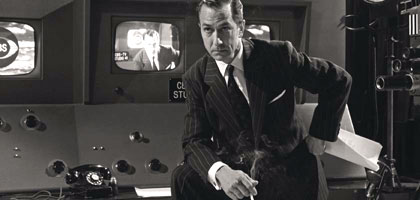Primary navigation


Geoffrey Macnab on George Clooney's tribute to speaking your mind
George Clooney's second feature as a director is set in the early 1950s at the height of Senator Joe McCarthy's communist witch-hunt. CBS reporter and anchorman Ed Murrow, one of the legendary figures of US journalism, challenges McCarthy's bullyboy tactics on air. In doing so he puts his career in jeopardy and exposes the network to McCarthy's wrath.
Clooney's film has the same edge and intensity as the live US television dramas of the 1950s (Marty, Requiem for a Heavyweight). He fills the soundtrack with music from jazz singer Dianne Reeves and the film is shot in black and white with almost all the action concentrated in the CBS offices and studios where Murrow works. As in the great cinéma vérité documentaries Primary and Crisis (which Clooney has acknowledged as influences), there is often a sense that we are eavesdropping on momentous events.
Good Night, and Good Luck is also a celebration of professionalism. Clooney (whose father was an anchorman) evokes a lost era of journalism, long before the excesses of Jayson Blair, Stephen Glass and Fox News besmirched the reputation of the US media. By 1958, the point at which the film starts with Murrow making a valedictory speech, the rot is already setting in. Murrow may be revered, but his bosses no longer want him on the air.
The screenplay, by Clooney and Grant Heslov, doesn't just concentrate on the Murrow vs McCarthy stand-off. As in all newsroom dramas, there is an emphasis on the camaraderie and backbiting behind the scenes. One newscaster is so dismayed at being labelled a communist that he is driven to suicide. Another couple need to keep their marriage secret or risk losing their jobs.
"I didn't make this film as a protest against any administration," Clooney has stated. "I made this film as a historical record because I grew up as a fan of Murrow." Nonetheless, he points out that Good Night, and Good Luck (the title comes from Murrow's catchphrase) is not intended as a biopic. Few Americans nowadays remember the great newscaster - and at a preview screening in Los Angeles, 70 per cent of the audience didn't even recognise McCarthy.
David Strathairn's extraordinary performance dominates the film with its gravitas, pathos and even a streak of deadpan humour. With a cigarette held between thumb and forefinger, the chain-smoking Murrow banters with colleagues, but the moment he's on air he speaks intently and with utter conviction. "We needed an actor who seems to hold the weight of the world on his shoulders. You always felt that with Murrow," says Clooney of the decision to cast character actor Strathairn (best known for his roles for his friend John Sayles).
McCarthy, meanwhile, plays himself in that Clooney uses only old newsreel footage for the Wisconsin senator. "If we'd had an actor, people would have said we were making him too harsh or too feeble," the director says. "We thought McCarthy could do the best job playing himself - there's even word that he's up for Best Supporting Actor."